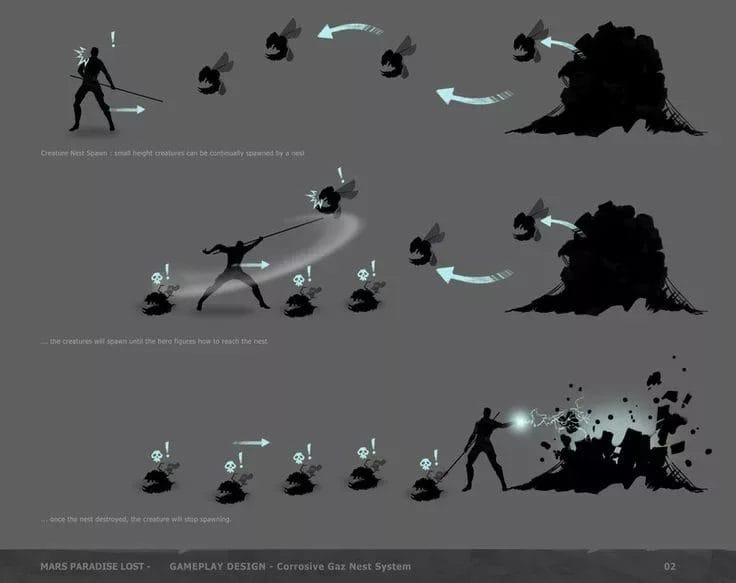Gameplay definition
In the world of video games, gameplay refers to the interactive and dynamic experience that players have while engaging with a game. It encompasses all the activities, mechanics, rules, and systems that make up the player’s interactions within the game world.
At its core, gameplay is about providing an enjoyable and engaging experience for players. It includes elements such as controlling a character or avatar, solving puzzles, making decisions, exploring virtual environments, engaging in combat or competition, completing objectives or quests, and progressing through levels or storylines.

Gameplay categorization
Gameplay can be categorized into various types based on the genre of the game. For example:
- Action Gameplay: This involves fast-paced and intense gameplay focused on physical challenges like combat, platforming, or racing.
- Role-playing Gameplay (RPG): RPGs typically feature deep narratives and character progression where players assume the role of a specific character or create their own. They often involve quests, exploration, decision-making, and strategic combat.
- Puzzle Gameplay: These games challenge players to solve puzzles or brain teasers by using logic and problem-solving skills. Examples include Sudoku or Tetris.
- Strategy Gameplay: Strategy games require players to plan and execute actions to achieve specific goals. They involve resource management, tactical decision-making, base-building, and sometimes even diplomacy. Games like Civilization or StarCraft fall under this category.
- Simulation Gameplay: Simulation games aim to replicate real-life experiences in a virtual environment. Examples include flight simulators or city-building games like SimCity, which showcase unique gameplay mechanics.
- Adventure Gameplay: Adventure games emphasize storytelling and exploration in richly detailed worlds filled with characters and puzzles that need to be discovered and solved.
These are just a few examples; there are many more genres each offering unique gameplay experiences.
In addition to these genre-specific elements, other aspects that contribute to game design include gameplay. gameplay include game controls (keyboard/mouse/controller/touchscreen), camera perspectives (first-person/third-person), physics systems, artificial intelligence of non-player characters (NPCs), multiplayer interactions, and more.
Ultimately, gameplay is what makes video games interactive and captivating. It is the heart of the gaming experience that keeps players engaged and entertained by providing challenges, rewards, progression, and a sense of immersion in a virtual world.
What are the elements of gameplay?
- Goals/objectives: The aims that provide direction and motivation for the player. Could be narrative-based, progression-based, skill-based, or defined by gameplay mechanics.
- Rules: The limitations and allowed behaviors that provide structure and challenges. Things like physics, tokens, legal moves, etc.
- Mechanics: The actions, behaviors and control schemes that allow the player to interact with the game. Shooting, jumping, managing resources, etc.
- Rewards & feedback: Elements like points, power-ups, cutscenes, music cues, etc. that provide gratification, progression clarity, or storytelling.
- Challenge: Tests of skill with an appropriate, escalating difficulty curve that keeps players engaged without being frustrating.
- Pacing: The speed and duration of experiences. Varies based on genre – a FPS feels different than a turn-based RPG in terms of gameplay mechanics.
What is a gameplay genre?
- Action – real-time gameplay demanding quick reflexes and precise control. Platformers, fighting games.
- Adventure – exploration and puzzle-solving focused games often with strong narratives. Point-and-click, walking simulators.
- Role-playing – leveling up a character and acquiring new abilities and gear. MMORPGs, action RPGs.
- Strategy – emphasizes strategic thinking and long-term resource planning to meet objectives. RTS, turn-based tactics, 4X.
- Sports – simulating athletic competitions with an emphasis on accessible, realistic gameplay. FIFA, NBA 2K, Rocket League.
What are 5 characteristics of games?
- Interactivity – players actively participate in making choices that impact the experience.
- Conflict – opposing forces that create challenges for the player to overcome. Could be NPC enemies, timer, competing players.
- Rules – limitations that provide structure, goals, challenges, and balance.
- Engagement – gameplay should be compelling and keep the player’s attention.
- Social aspect – multiplayer and community features that allow for shared experiences.
What are the characteristics of playability?
- Learnability – how easily a new player can grasp the controls and rules.
- Effectiveness – how accurately and efficiently players’ inputs translate into the desired outcome.
- Satisfaction – how enjoyable and rewarding the core gameplay loop feels.
- Immersion – how engrossing the overall atmosphere and experience is.
- Challenge – having an appropriate difficulty curve tailored to genre and players’ skills.
Interested in knowing more definitions about the games industry? Check the glossary
Frequently Asked Questions about Gameplay
Q: What is the definition of gameplay?
A: The definition of gameplay refers to the specific mechanics and interactions that occur while playing a game. It encompasses how players engage with the game, including the rules, objectives, and actions available within the context of video games or board games.
Q: How does graphic quality influence gameplay?
A: The graphic quality can significantly affect gameplay by enhancing the overall gaming experience. High-quality graphics can immerse players in the game world, making it easier to engage with the game’s environment and story, while lower-quality graphics may detract from the player experience.
Q: What are some common game genres and their gameplay mechanics?
A: Game genres vary widely, each with unique gameplay mechanics. For instance, action games often involve fast-paced combat and reflex-based mechanics, while strategy games focus on resource management and tactical planning. Understanding these game genres helps players identify their preferences in gameplay.
Q: What is cooperative gameplay and how does it differ from competitive gameplay?
A: Cooperative gameplay involves players working together to achieve a common goal, while competitive gameplay pits players against each other. This distinction affects the player experience, as cooperative gameplay often emphasizes teamwork and strategy, whereas competitive gameplay focuses on individual skill and performance.
Q: How can I analyze my gameplay to improve my skills?
A: To analyze your gameplay, you can review gameplay footage, examine your decision-making processes, and identify areas for improvement. Engaging with gaming content on platforms like Quora or Wikipedia can provide insights into strategies and techniques used by experienced gamers.
Q: What role do developers play in shaping gameplay?
A: Developers are crucial in shaping gameplay as they design game mechanics, levels, and graphics. Their expertise in game development determines how players will interact with various parts of the game, ultimately influencing the overall player experience.
Q: What are some top posts discussing the meaning of gameplay?
A: You can find top posts on platforms like Quora and gaming forums that explore the meaning of gameplay. These discussions often delve into the definition of gameplay, its importance in the gaming industry, and how it affects player engagement and enjoyment.
Q: How do different platforms affect how a game can be played?
A: Different platforms, such as PC, consoles, or mobile devices, can influence gameplay by dictating controls, graphics, and available game genres. Each platform has its unique features that affect how players interact with the game and the overall experience they receive.
Q: What is the significance of game mechanics in gameplay?
A: Game mechanics are the foundational rules and systems that facilitate gameplay. They dictate how players interact with the game world, influencing both the challenge and enjoyment of the game. Understanding these mechanics is essential for mastering any specific game.
Q: How can I unlock new gameplay elements in a game?
A: Unlocking new gameplay elements typically involves completing specific challenges, progressing through the game, or achieving certain milestones. This aspect of gameplay is designed to enhance player engagement and encourage exploration within the game’s environment.
« Back to Glossary Index




